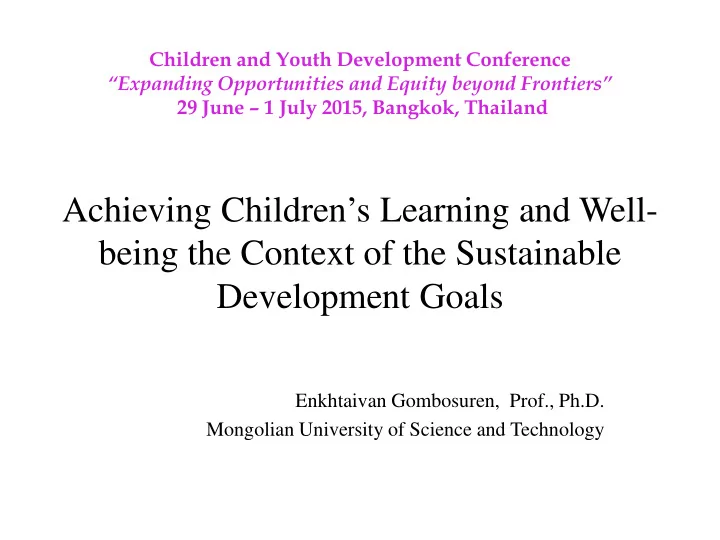

Children and Youth Development Conference “Expanding Opportunities and Equity beyond Frontiers” 29 June – 1 July 2015, Bangkok, Thailand Achieving Children’s Learning and Well- being the Context of the Sustainable Development Goals Enkhtaivan Gombosuren, Prof., Ph.D. Mongolian University of Science and Technology
SUSTAINABLE DEVELOPMENT Sustainable development ( SD ) is a process for meeting human development goals while sustaining the ability of natural systems to continue to provide the natural resources and ecosystem services upon which the economy and society depend. Human development is a well-being concept within a field of international development.
RDA for Mongolians
ANNUAL CONSUMPTION OF FOOD PRODUCTS of Mongolians Food Products 1988 1999 2002 2009 2012 2013 RDA Meat 88,2 112,8 99,6 100,8 98.4 97,2 63,9 160.8 Milk, dairy 116,7 146,4 100,8 160,8 160,8 154,2 Butter 2,9 2,4 2,4 3,6 3,6 3,6 - Cereals, croissant 106,9 99,6 110,4 126,0 126 121,2 116,8 A Rice - 9,6 15,4 21,8 21,6 21,6 28,5 Sugar 23,7 8,6 12,0 16,4 16,8 16,8 8,4 Egg 26,9 3,8 14,4 38,4 38,4 43,2 116,0 38,4 38,4 Potato 28,2 16,8 26,4 38,4 51,1 Vegetable 22,6 12,0 16,4 24,0 24,0 24,0 73,0 11,2 2,4 3,6 8,4 8,4 8,4 Fruits 67,5 Vegetable/animal oils 1,3 1,2 6,0 6,0 6,0 6,0 9,1 Ganzorig D. “Updates from Mongolia”, WHO Region al Workshop on Implementing Monitoring the Action plan to Reduce the Double Burden of Malnutrition in the Western Pacific Region (2015-2020), March, 25, 2015, Manila, Philippines
MONGOLIAN FOOD POLICY PRINCIPLE Food security a comprehensive package of Food Food action related to: supply, safety access -ensuring -food supply -access Nutrition -consumption -sustainability -safety
NATIONAL PROGRAMME FOR FOOD SECURITY (2013) • GOAL: • - to provide the entire nation with secure supplies of accessible, nutritious and safe food • to enable healthy livelihoods and high labor productivity, - founded on participation of people, government, the public and private sectors. • Defined priority Pillars such as • “Food supply, access – Quality, safety – Nutrition”
GOLDEN TRIANGLE • Food supply: • Argiculture • Food factory • Disribution • Nutrition: • Biological active substance • Energy • Cells development • Food quality and safety: • Responsibility of factories • State control, monitoring • Consumer education
SUSTAINABLE DEVELOPMENT GOALS End hunger, achieve food security and improved nutrition and promote sustainable agriculture: The climate and the soil of the Mongolian land is differ by the Region. It needs to promote the agro technical trainings on: “how to grow the vegetable on what kind of soil ”. For “ The Agriculture based School Lunch Model Program” Project needs to include short training “The Management of Self Financial system” (about this Model we could to know when visited one of the Model school in Thailand in 2009). For Mongolian case of the Project: To promote the animal husbandry, but if school keeps less than 5-6 cow, it will be non profit husbandry with high production cost. So, school should aspire to growth number of animal.
SUSTAINABLE DEVELOPMENT GOALS Ensure availability and sustainable management of water and sanitation for all For Mongolia, in almost soum there are a serious problem on water supply . Almost all water, about 80 percent of drinking water is comes underground. The states of the water in dependent on how far deep gets water. In steppe and desert area usually get water from about 150 m deep. For example: Bayan soum gets chalky water, because the soil contains chalk. The surface of the land covered by chalk and it will be difficult to growth vegetable.
SUSTAINABLE DEVELOPMENT GOALS Involve school children in to the process of animal husbandry during implementing the Project; Children get the knowledge of economics, finance; To know labor organizations, to brought up thru working (Mongolians nave traditions for hundreds of years); To know how to harmonize the Theory and Practice To know the nutritional composition and the benefit of the vegetable , which growth by the student, and to encourage enthusiasms;
SUSTAINABLE BIODIVERSITY and DIET To encourage sustainable biodiversity: Mongolians traditional food To introduce the new concepts of Nutrition and Dietary Recommended Intake - Seasonal diet, especially in rural/nomadic life style To improve Nutritional Education of all soum population – school children, their parents and the teachers To give a recommendation to the Government to be work in the prefecture and soum/school Dietitian
Recommend
More recommend